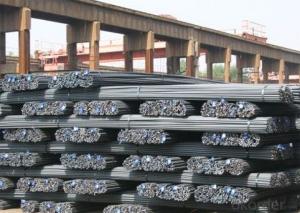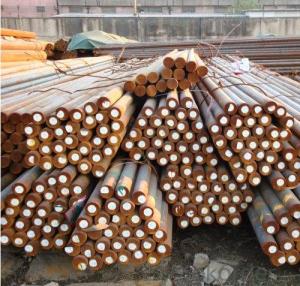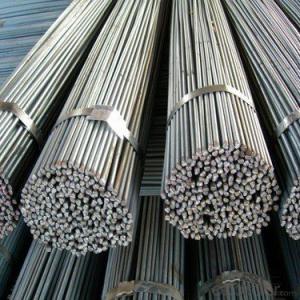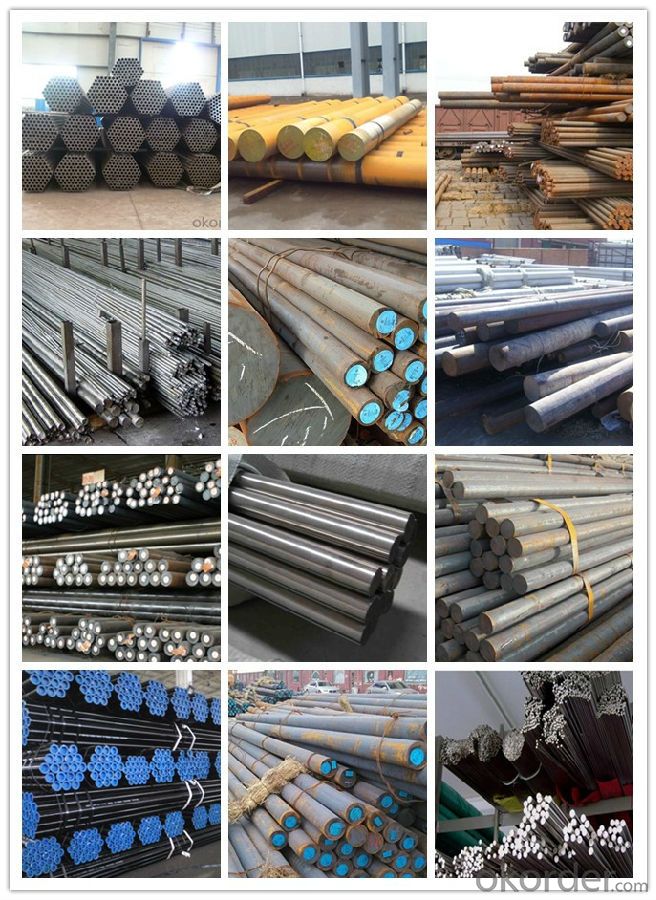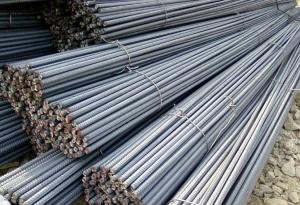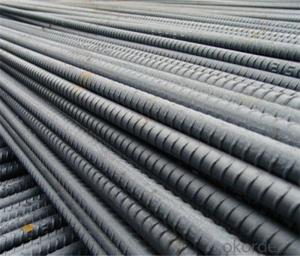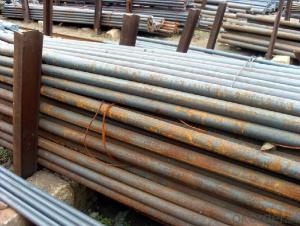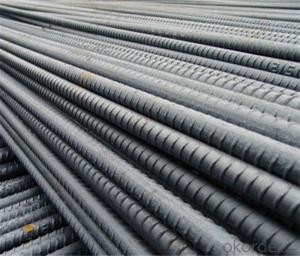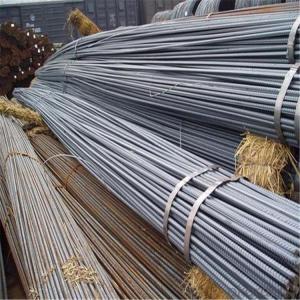Rebar Deformed Bar Steel Construction Steel Rebar
- Loading Port:
- China main port
- Payment Terms:
- TT OR LC
- Min Order Qty:
- 30 m.t.
- Supply Capability:
- 10000 m.t./month
OKorder Service Pledge
OKorder Financial Service
You Might Also Like
Specification
Product Introduction
| 1.Specification | ||||||
| Deformed steel bar | Diameter(mm) | Length (mm) | ||||
| 6~50 | 3000~9000 | |||||
| *Specification can be customized for sure. | ||||||
| 2.Chemical Compositons | ||||||
| Grade | C | Si | Mn | P | S | CEQ |
| HRB335 | 0.25 | 0.8 | 1.6 | 0.045 | 0.045 | 0.52 |
| HRB400 | 0.25 | 0.8 | 1.6 | 0.045 | 0.045 | 0.54 |
| HRB500 | 0.25 | 0.8 | 1.6 | 0.045 | 0.045 | 0.55 |
| 3.Delivery Conditions | ||||||
| Hot forged +Rough machined (black surface after Q/T)+ Turned (optional) | ||||||
| 4.Typical Applications | ||||||
| a.Construction of all types of concrete use | ||||||
| b.Bridge&Road&Building | ||||||
Product show
Workshop show
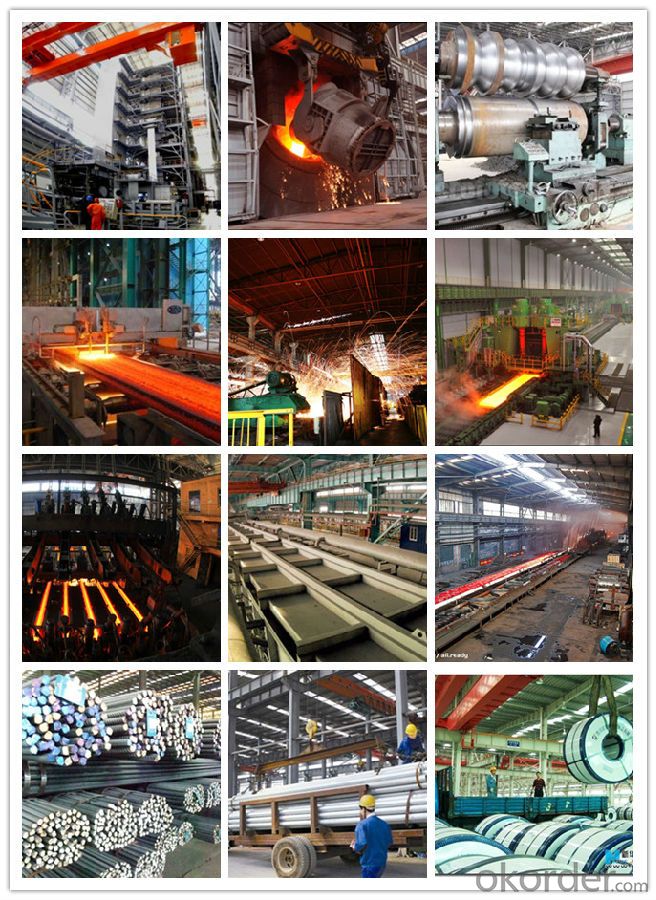
Shipping
1. FedEx/DHL/UPS/TNT for samples, Door-to-Door;
2. By Air or by Sea for batch goods, for FCL; Airport/ Port receiving;
3. Customers specifying freight forwarders or negotiable shipping methods!
Delivery Time: 3-7 days for samples; 5-25 days for batch goods.
Payment Terms
1.Payment: T/T, L/C, Western Union, MoneyGram,PayPal; 30% deposits; 70% balance before delivery.
2.MOQ: 1pcs
3.Warranty : 3 years
4.Package Informations: 1) EXPORT, In 20 feet (GW 25 ton) or 40 feet Container (GW 25 ton)
2)as customer's requirement
Why choose us?
(1) The leading exporter in China special steel industry.
(2) Large stocks for various sizes, fast delivery date.
(3) Good business relationship with China famous factories.
(4) More than 7 years steel exporting experience.
(5) Good after-sales service guarantee.
- Q: How is special steel used in the defense manufacturing process?
- Special steel is commonly used in the defense manufacturing process due to its exceptional strength, durability, and resistance to extreme conditions. It is utilized in the production of various defense equipment and components such as armored vehicles, submarines, aircraft carriers, and ballistic missiles. Special steel is crucial for enhancing the overall performance, reliability, and safety of these defense systems, making it an essential material in the defense manufacturing industry.
- Q: What are the different processes involved in making special steel?
- The different processes involved in making special steel include melting and refining the raw materials, such as iron ore and scrap metal, in a furnace to create liquid steel. This liquid steel is then cast into various shapes using techniques like continuous casting or ingot casting. After casting, the steel undergoes heat treatment processes like annealing, quenching, and tempering to enhance its mechanical properties. Additionally, special alloying elements are added during the melting stage to give the steel specific characteristics, such as increased strength or corrosion resistance. Finally, the steel is finished by processes like machining, grinding, and polishing to meet the desired specifications and quality standards.
- Q: What is the role of special steel in the defense industry?
- Special steel plays a crucial role in the defense industry by providing materials with exceptional strength, durability, and resistance to extreme conditions. It is used in the manufacturing of various defense equipment, including armored vehicles, naval vessels, aircraft, and firearms. Special steel ensures superior performance and protection, helping to enhance the safety and effectiveness of military operations.
- Q: How does special steel contribute to the creep resistance of products?
- Special steel contributes to the creep resistance of products through its unique properties and composition. Creep is the gradual deformation of a material under constant stress over time, and it is a critical concern in industries that require high temperatures and prolonged usage. Special steel, also known as high-temperature steel or heat-resistant steel, is specifically designed to withstand these extreme conditions and minimize creep. One of the key factors contributing to the creep resistance of special steel is its high melting point. Special steel is typically alloyed with elements such as chromium, nickel, molybdenum, and vanadium, which significantly increase its melting point compared to ordinary steel. This enhanced heat resistance allows special steel to maintain its structural integrity and resist deformation even at elevated temperatures. Moreover, the unique microstructure of special steel plays a crucial role in its creep resistance. Special steel is engineered to have a fine-grained structure, which improves its strength and prevents the movement of dislocations within the material. Dislocations are defects in the atomic arrangement of a material that can lead to creep deformation. By minimizing the movement of dislocations, special steel exhibits higher resistance to creep and maintains its shape and dimensional stability over extended periods. In addition to its microstructure, special steel often has a higher content of certain alloying elements. For instance, the addition of elements like molybdenum and vanadium enhances the creep strength of special steel by forming stable carbides within the material. These carbides act as barriers to dislocation movement, further impeding creep deformation and improving the overall creep resistance of the product. Furthermore, special steel is often subjected to advanced heat treatment processes, such as quenching and tempering, to optimize its mechanical properties and enhance its creep resistance. These heat treatments help to refine the microstructure, improve the distribution of alloying elements, and increase the hardness and strength of the material, all of which contribute to better resistance against creep. Overall, special steel's ability to withstand high temperatures, its unique microstructure, and its alloying elements and heat treatment processes combine to provide exceptional creep resistance. This makes special steel an ideal choice for various applications that require durability and longevity under extreme thermal conditions, such as gas turbines, nuclear reactors, high-temperature boilers, and aerospace components.
- Q: What are the different types of welding techniques used for special steel?
- Special steel can be welded using various techniques depending on its specific requirements and properties. Some commonly used techniques for welding special steel include: 1. Stick welding, also known as Shielded Metal Arc Welding (SMAW), involves using a consumable electrode coated in flux to create an electric arc between the electrode and the base metal. This technique is ideal for thicker sections of special steel due to its ability to generate high heat and deep penetration. 2. Gas Metal Arc Welding (GMAW), also known as MIG welding, utilizes a continuously fed wire electrode and a shielding gas to protect the weld from atmospheric contamination. Its versatility and ability to produce high-quality welds with good control make it widely used for special steel. 3. Gas Tungsten Arc Welding (GTAW), also known as TIG welding, employs a non-consumable tungsten electrode and a shielding gas to create an electric arc. This technique is often preferred for special steel alloys that require precise control over the welding process and where weld quality and appearance are crucial. 4. Flux-Cored Arc Welding (FCAW), similar to GMAW, employs a continuously fed tubular electrode filled with flux. This technique is commonly used for special steel applications that necessitate high deposition rates and deep penetration, such as heavy fabrication or structural welding. 5. Submerged Arc Welding (SAW) involves creating an arc between a continuously fed bare electrode and the workpiece, while a layer of granular flux covers the arc. This technique is typically used for heavy-duty applications and thick materials, providing excellent weld quality and high deposition rates. 6. Laser Beam Welding (LBW) utilizes a highly focused laser beam to melt and join special steel parts. It offers precise control, high welding speeds, and minimal distortion, making it suitable for specialized applications that require high precision and minimal heat-affected zones. It is crucial to consider factors such as material composition, thickness, joint configuration, and desired weld properties when selecting the appropriate welding technique for special steel. Expertise and knowledge are essential to determine the best technique for a specific application, ensuring optimal results in terms of weld quality, strength, and durability.
- Q: How does special steel contribute to improving product performance?
- Special steel contributes to improving product performance in several ways. Firstly, special steel has superior strength and durability compared to regular steel, making it more resistant to wear, corrosion, and impact. This increased durability ensures that products made with special steel have a longer lifespan and can withstand harsh conditions, ultimately enhancing their performance and reliability. Additionally, special steel can be tailored to have specific characteristics, such as high temperature resistance or magnetic properties, which can be crucial for certain applications. By using special steel, manufacturers can create products with enhanced functionality, efficiency, and safety, ultimately leading to improved overall performance.
- Q: What are the properties of weathering steel?
- Weathering steel, also known as corten steel, possesses several distinctive properties. It exhibits high resistance to corrosion, making it suitable for outdoor structures without the need for protective coatings. Its unique composition allows for the formation of a stable rust-like appearance, providing an aesthetically pleasing and natural finish. Moreover, weathering steel has excellent strength and durability, making it ideal for various applications, including bridges, buildings, and architectural elements.
- Q: What are the requirements for special steel used in aerospace defense applications?
- Due to the critical nature of aerospace defense applications, the demands for special steel are highly rigorous. The steel must meet several key requirements: 1. Exceptional strength is necessary to withstand extreme conditions and loads, ensuring the structural integrity of aircraft and defense equipment. 2. The steel must have excellent corrosion resistance to combat the harsh environments it encounters, such as moisture, saltwater, and chemicals. This prevents degradation and maintains performance over time. 3. Withstanding high temperatures without compromising mechanical properties is crucial for components operating in high-temperature environments, like jet engines and rocket nozzles. 4. Fatigue resistance is essential as aerospace defense applications involve repeated stress cycles. The steel should be able to resist fatigue failure, ensuring long service lives without failure. 5. Weight reduction is a critical factor to enhance fuel efficiency, payload capacity, and overall performance. The special steel must have a high strength-to-weight ratio, allowing for lighter structures without compromising strength. 6. To ensure reliability and longevity in demanding operational conditions, the steel used must have a high level of purity and cleanliness, minimizing the presence of impurities and defects. 7. Compatibility with other materials, such as aluminum alloys and composite materials commonly used in aerospace defense applications, is essential for reliable and efficient integration of different components and structures. Meeting these requirements often involves utilizing advanced manufacturing techniques such as vacuum melting, precise alloying, and heat treatment processes. Additionally, strict quality control measures, including non-destructive testing and material certification, are crucial to guarantee the performance and reliability of special steel in aerospace defense applications.
- Q: How does special steel contribute to the manufacturing aftermarket industry?
- Special steel plays a significant role in the manufacturing aftermarket industry by offering enhanced performance, durability, and reliability in the production of various components and equipment. One of the key contributions of special steel is its ability to withstand extreme conditions, such as high temperatures, corrosive environments, or heavy loads. This makes it an ideal material for manufacturing critical parts used in industries like automotive, aerospace, energy, and machinery. In the manufacturing aftermarket industry, special steel is commonly used in the production of replacement parts for machinery or equipment that have become worn out or damaged over time. The use of special steel ensures that these replacement parts possess the necessary strength and resilience to meet the original equipment manufacturer (OEM) specifications. Furthermore, special steel allows for the development of innovative designs and the production of more efficient and lightweight components. This helps in improving the overall performance of the equipment, reducing energy consumption, and enhancing productivity. For example, in the automotive industry, special steel is used to manufacture lightweight engine components, resulting in improved fuel efficiency and reduced emissions. Moreover, the use of special steel in the manufacturing aftermarket industry contributes to the reduction of maintenance and downtime costs. By using high-quality steel, the longevity of the replacement parts is increased, reducing the frequency of repairs or replacements. This leads to a decrease in production downtime and associated costs, as well as improving the overall reliability of the equipment. Additionally, special steel offers a wide range of customization options, enabling manufacturers to tailor the material properties to specific requirements. This flexibility allows for the development of unique solutions and the production of specialized components that meet the demands of various industries. It also enables manufacturers to address specific challenges related to wear resistance, hardness, or toughness, which are crucial factors in the aftermarket industry. In conclusion, special steel contributes significantly to the manufacturing aftermarket industry by providing enhanced performance, durability, and reliability to replacement parts. Its ability to withstand extreme conditions, enable innovative designs, reduce maintenance costs, and offer customization options makes it an indispensable material in the production of components and equipment in various industries.
- Q: How does special steel contribute to the manufacturing of hydraulic components?
- Special steel plays a crucial role in the manufacturing of hydraulic components due to its unique properties and characteristics. Hydraulic components, such as cylinders, pumps, valves, and fittings, work under high pressure and extreme conditions. Therefore, they require materials that can withstand these demanding environments. Special steel, also known as alloy steel, is specifically designed to possess exceptional strength, durability, and resistance to corrosion and wear. These properties make it an ideal material for hydraulic components, as they need to withstand high pressures, constant movement, and exposure to various fluids. The high strength of special steel allows hydraulic components to handle heavy loads and resist deformation, ensuring their long-term reliability and performance. Additionally, the durability of special steel ensures that hydraulic components can endure the continuous stress and movement without experiencing premature failures. Another significant advantage of special steel is its resistance to corrosion and wear. Hydraulic components often come into contact with different fluids, including water, oil, and chemicals. Special steel's resistance to corrosion protects the components from degradation and extends their lifespan. Furthermore, its resistance to wear minimizes the damage caused by friction, ensuring smooth operation and reducing maintenance requirements. Moreover, special steel can be easily machined and formed into complex shapes, allowing for the production of intricate hydraulic components with precise specifications. This versatility enables manufacturers to create components that are tailored to the specific requirements of different hydraulic systems, ensuring optimal performance and efficiency. In conclusion, special steel contributes significantly to the manufacturing of hydraulic components by providing the necessary strength, durability, corrosion resistance, and wear resistance. Its unique properties enable the production of high-quality and reliable hydraulic components that can withstand demanding environments and ensure the smooth operation of hydraulic systems.
Send your message to us
Rebar Deformed Bar Steel Construction Steel Rebar
- Loading Port:
- China main port
- Payment Terms:
- TT OR LC
- Min Order Qty:
- 30 m.t.
- Supply Capability:
- 10000 m.t./month
OKorder Service Pledge
OKorder Financial Service
Similar products
Hot products
Hot Searches
Related keywords
